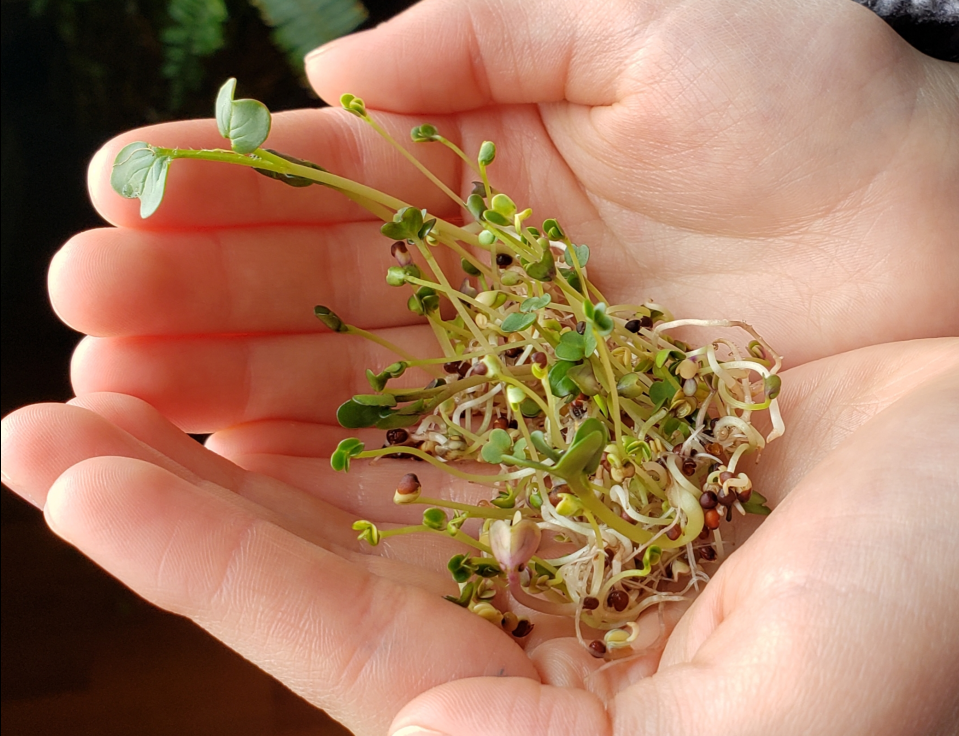Let's grow sprouts! Home-grown sprouts are a healthy addition to a salad, a sandwich or just about anything else. It is also a great way to get that gardening fix that we need in spite of cold outside conditions. Growing sprouts is inexpensive, nutritious and easy. One could go so far to say that pound for pound, sprouts are perhaps the most nutritious food there is from the dollar value perspective. Sprouts are the most concentrated and truly natural sources of vitamins, minerals, enzymes and amino acids known. Better yet, they can be grown indoors in any climate and are ready to eat in only a few days. These tiny, easy-to-digest plants are at their peak of nutritional value, as the seed releases all of its stored nutrients in a burst of vitality in the journey to becoming a full sized plant.
You could look at sprouts as a powerful battery of nutrients that can rival citrus fruits in vitamin C and beef in protein and actually surpass almost any other known food source in completeness! Just one more positive thing is these squiggly little vegetables are delicious, economical and an ideal food for weight watchers as one fully packed cup of mung, alfalfa or radish shoots contains under 20 calories.
The challenge of growing sprouts is pretty low. It is easy for almost anyone who wishes to enjoy fresh and natural food year round. If you have a spot where you are living that is comfortable for you, a good source of clean water - then you will be a successful sprout grower. You just need to attend to your babies twice each day.
There are many sources for the seeds that are suitable for sprouters. For example - "seed quality" beans are better than " food quality” beans as the seed quality will always show a better germination rate which is important for those wanting to see sprouts grow. My favourite source for seeds to sprout has and will likely always be Mumm's (https://sprouting.com/) as they are a local business that is totally dedicated to selling a quality product and have superb selection. They are located close to Shellbrook, SK. However, you may also purchase sprout seeds in health-food stores, specialty shops and many other mail-order houses and shops.

A basic sprouting system is simply any receptacle that is large enough to hold the finished sprouts, but not made of wood or metal. Since the sprouting container must be kept covered, anything that comes with its own lid is a good choice. I simply use canning jars of various sizes depending on the amount of seed I am sprouting. However, you can also purchase a little grow unit from many of our seed supply houses, including Mumm's.
The instructions for growing are simple. Simply find a jar or other receptacle, a bit of fine netting, a rubber band, clean fresh water and of course some seeds to germinate. If you have chosen to sprout in a jar you can soak the seed in the same jar. If not, any sterile container will do. Use about one cup of water to every tablespoon of seed. Soak the seeds for a short time to get that germination started and then rinse and drain your seeds two to three times daily. I like to invert the jar on an angle in a small bowl to allow the excess water to drain. Last but not least, enjoy! Swirl the finished sprouts in clean water to separate the hulls and rinse the sprouts gently. Drain and allow to dry for a few hours and store in the fridge until consumed.
Hanbidge is the Lead Horticulturist with Orchid Horticulture. Find us at www.orchidhort.com; by email at [email protected]; on Facebook and on Instagram at #orchidhort. Tune into GROW Live on our Facebook page or check out the Youtube channel GROW.




